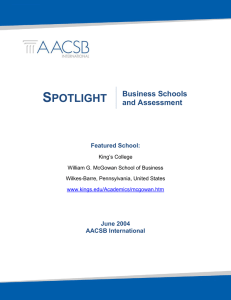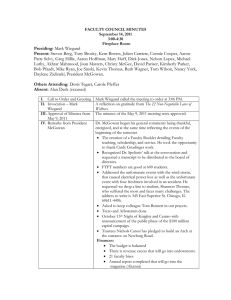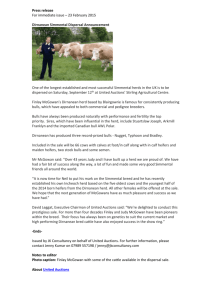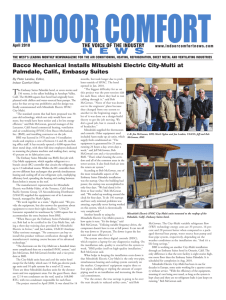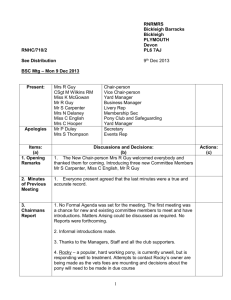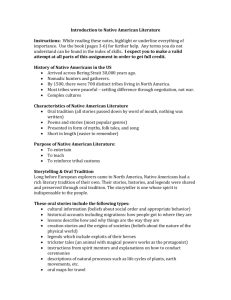The William G - King`s College
advertisement
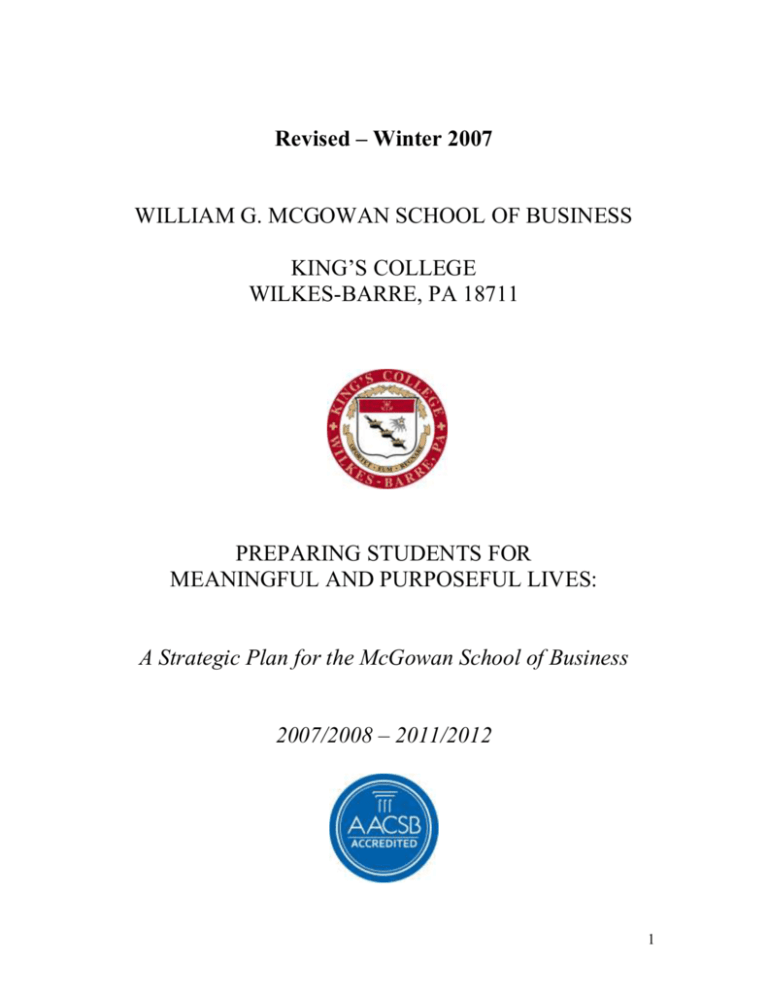
Revised – Winter 2007 WILLIAM G. MCGOWAN SCHOOL OF BUSINESS KING’S COLLEGE WILKES-BARRE, PA 18711 PREPARING STUDENTS FOR MEANINGFUL AND PURPOSEFUL LIVES: A Strategic Plan for the McGowan School of Business 2007/2008 – 2011/2012 1 VISION The William G. McGowan School of Business seeks to be a leader in undergraduate business education in the Catholic tradition in the Middle Atlantic Region Undergraduate Business Education Catholic Tradition Professional Competency Ethical Competency “To teach students not only how to make a living, but how to live” (Fr. James Connerton, C.S.C. – founding President of King's College) MISSION The King’s College McGowan School of Business seeks to develop in its students the professional knowledge and skills needed to function successfully in the global economy and a commitment to exercising their professional responsibilities in an ethical and socially responsible manner. To achieve these goals, the School of Business provides a student-centered learning environment designed to stimulate intellectual development, encourage critical and ethical thinking, and develop professional competencies that are current with today’s business environment. Through a broad based liberal education in the Catholic tradition, graduates make ethical and humanistic contributions to the dynamic, global marketplace, based on a lifetime of learning and personal growth. 2 VALUES STATEMENT1 “Society has a greater need for people of values than it has for scholars. Knowledge itself does not bring about positive values, but positive values do influence knowledge.” From Christian Education (1854) By Fr. Basil Moreau, founder of the Congregation of Holy Cross As an institution founded in the Holy Cross tradition of service to the underserved, King’s College continues to educate students with a wide range of socio-economic, intellectual, and religious backgrounds. Accepting the charge of carrying on the Holy Cross tradition, we, as the faculty of the McGowan School of Business, seek to instill in our students values of: Professionalism, demonstrated in the both the quality of their work and in commitment to their clients’ interests; Integrity, formation of students in the practices of academic and personal honesty at King's College forms students lives of integrity beyond the campus; Civility, appreciation for diversity and the true spirit of collaboration based on a commitment to the fair, accurate, nonviolent expression and working out of differences; and Service, an understanding of and commitment to accountability and civic responsibility aimed towards the common good. 1 Teaching Students to Live the Mission: A Preliminary Report on the Status of Moral Formation at King’s College by Joel James Shuman, Associate Professor of Theology. 3 DINSTINCTIVE CAPABILITIES AND STRATEGIC PRIORITIES Goal 1: Business Ethics and Social Responsibility across the Curriculum. The William G. McGowan School of Business aspires to become a national leader in best practices for the development and assessment of moral leadership and social responsibility. Goal 2: Teaching Excellence. The William G. McGowan School of Business provides a student centered learning environment based on active learning techniques, small class size, and close faculty-student interaction. Goal 3: Assurance of Learning and Curricula. The William G. McGowan School of Business will become a national leader in Assurance of Learning. Curricula development and learning will be guided by a multifaceted assessment program. Goal 4: Student Centered. Education at King's College is student-centered Responding in 1946 to provide the sons of coal miners a Catholic higher education, King’s remains faithful to the tradition of placing student needs first. In addition, the School will make a number of initiatives to enhance student mentoring, career planning and placement activities. Goal 5: External Relations, Recognition and Supporting Resources. Among the strengths of The William G. McGowan School of Business are: AACSB accreditation, involved and supportive alumni – in a special way the Business Advisory Board, Facilities and the institutional of King's College. 4
